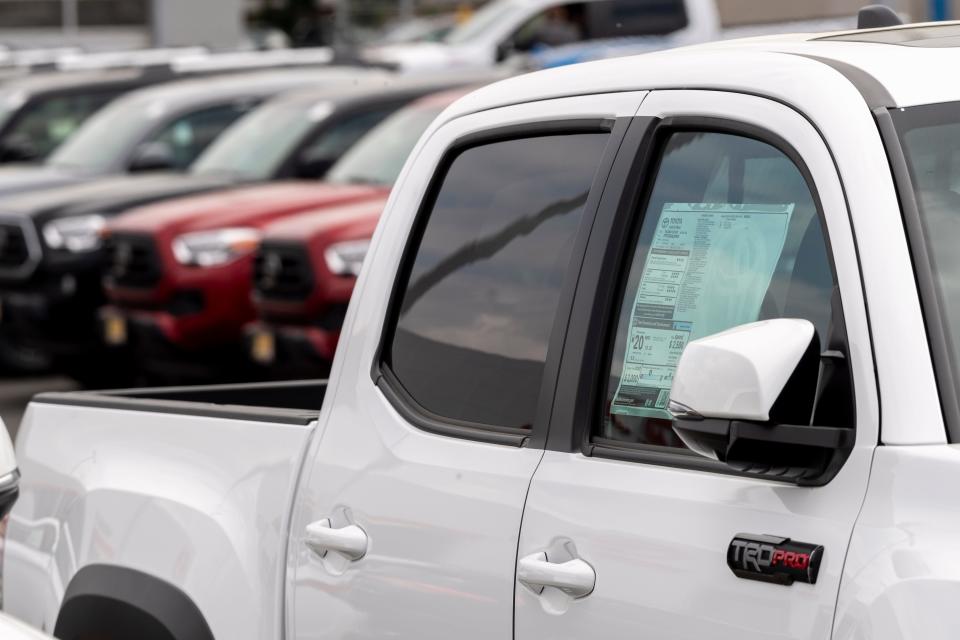Purchasing a new or used car in Delaware? How to avoid buying a lemon
Car dealerships may advertise deals that seem too hard to pass up.
But before you head out to shop for a new (or used) car, make sure you do your research and know what you’re purchasing before you drive it off the lot.
Delaware’s Department of Justice Consumer Mediation Unit fields hundreds of complaints each year from drivers who have issues with their vehicle purchases – whether it’s a lack of title and permanent records or mechanical issues that prevent a car from operating shortly after purchase.

From Nov. 1, 2022, through Oct. 31, the unit has received “about 400 motor vehicle complaints,” department spokesman Mat Marshall said.
“In general, they are CMU’s second-most common type of complaint after landlord-tenant issues,” he said. “We don’t sort complaints with enough granularity to say how many of each type we get beyond “motor vehicle,” but anecdotally the two most common issues are (1) problems with the condition of the car and (2) problems with getting proper titles/tags.”
DUIs, DISTRACTED DRIVING: What is driving crashes in Delaware and how to stay safe
To avoid purchasing a vehicle that will cause a lot of headaches, Consumer Mediation Unit special investigator Lavincent Harris has some tips to help Delaware residents.
Know the maintenance costs
If a buyer has an idea of the type of car they want to purchase, Harris said they should look up costs for maintenance and repairs, read reviews on the vehicle, and get a good sense of whether they’ll be able to afford the upkeep the car requires.
“The biggest thing you have is your fingertips. You can use your phone or laptop and do all the research you need to find out about that particular car you like – what issues, any recalls, look up the dealership, do a comparison of what other people are saying about that car.”
DRIVING IN WILMINGTON: How the city is working to address its parking woes, complaints
Once you have a car in mind, you’ll want to take those research skills a step further.
Do your research
Harris stressed potential buyers should look into the dealership, as well as the cars available for purchase.
“Purchasing a used car, or any car, is an emotional experience for the consumer. You are happy, you are excited,” Harris said.
That often leads to people ignoring the fine print on what’s being signed, he said.
You can look up ratings of dealerships on the Better Business Bureau website, as well as reviews of businesses on websites like Google and Facebook.

Harris also recommends budgeting to have the car you’d like to purchase inspected by a top-rated mechanic that is near the dealership you may be purchasing from.
CONSIDERING AN EV: Your buyer’s guide for an electric vehicle in Delaware, including rebates and deadlines
This will give potential buyers a better idea of the repairs that may be necessary on a used car purchase and can give the buyer bargaining power with the dealership, Harris said.
The dealership may have “all these beautiful pictures,” but an inspection could find major mechanical or aesthetic issues that will need to be handled, he said.
“You have to do your research and know what you are looking at because (the dealers) are going to make it look nice for you,” he said.
Harris said when he was car shopping, he had local mechanics inspect potential purchases before he’d even go in to test drive. This helped weed out cars that would have required significant money to fix, as well as identify car dealers who would be willing to do the repairs before the sale, he said.
Take it for a test drive
Once you’ve done all the research and – hopefully – the car and dealership check-out, Harris said then a buyer should schedule a time to visit the dealership and take the car for a test drive.
He recommended letting the car idle to see if smoke comes from the hood, if the check engine light comes on or if smoke comes from the exhaust. You should also take note of any cosmetic issues, warning lights and mechanical irregularities.
Harris said one case he handled was with a young driver who purchased a car after noticing the check engine light was on during their test drive.
“She ended up buying that vehicle, and she regrets it because there are a whole bunch of problems,” Harris said. “You have to be careful.”
Bought a problem car?
If you’ve purchased a car in Delaware already and are having issues – whether with accessing permanent records or mechanical issues – the first line of defense is contacting the dealer where you purchased the vehicle.
CONSUMER PROBLEMS: Why Indian Motorcycle dealerships, Intellicar were shuttered by Delaware DMV
“If they are not willing to fix a particular item, then you have to look at whether you are willing to pay for it,” Harris said. “If not, your recourse is going to be a civil matter.”
That means taking it to court.
FILE A COMPLAINT WITH THE DELAWARE DIVISION OF MOTOR VEHICLES
If your problem is gaining title and proof of ownership records for your purchase, or another more serious matter, drivers should file a complaint with the Division of Motor Vehicles and Department of Justice if the dealer is unresponsive or unwilling to resolve the problem.
CONTACT THE DEPARTMENT OF JUSTICE WITH AUTO CONCERNS
If you bought a new car and it’s having mechanical issues, Delaware’s Lemon Law may apply.
The state law dictates that “when a new car doesn’t conform to the manufacturer’s express warranty, and the consumer reports the issue to the manufacturer (or its agent or dealer) during the term of the warranty, the manufacturer (or its dealer or agent) should make necessary repairs to conform to the new auto warranty within a reasonable time.”
Got a tip? Contact Amanda Fries at afries@delawareonline.com. Follow her on X at @mandy_fries.
This article originally appeared on Delaware News Journal: Buying a new car in Delaware? Tips and tricks to avoid buying a lemon

